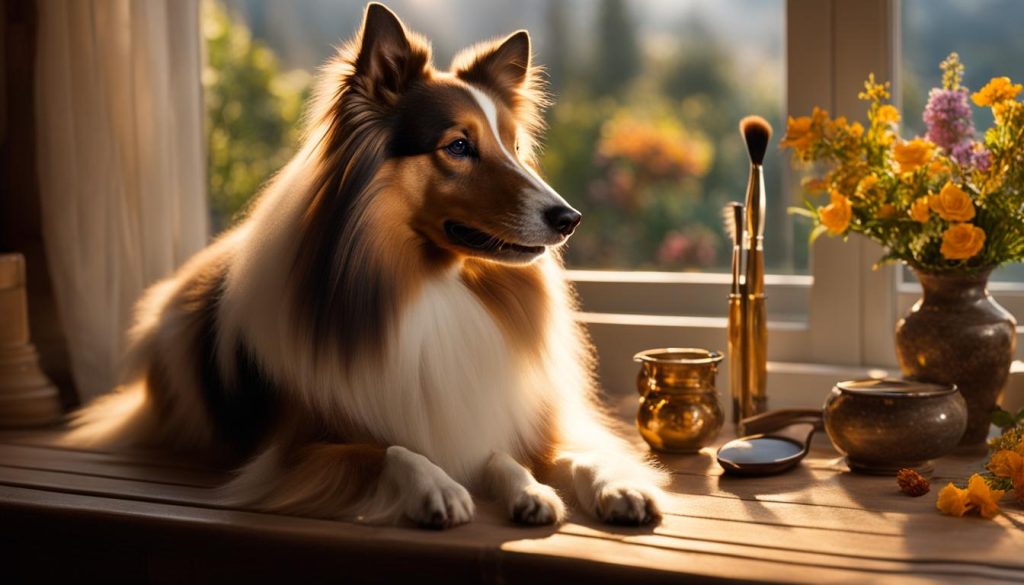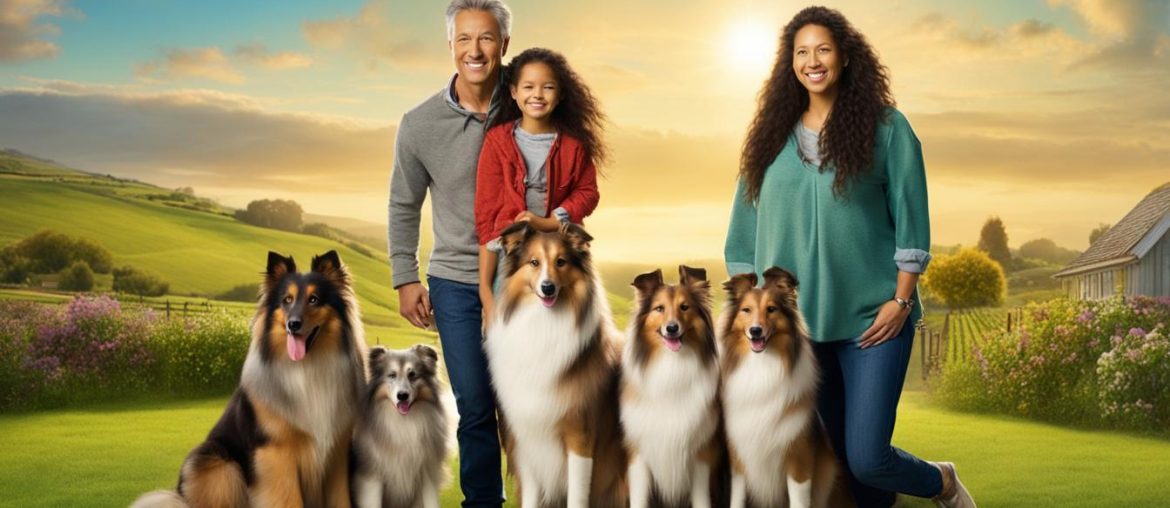As a professional journalist and copywriter, I am often asked about the best family dogs. One breed that frequently comes to mind is the Shetland Sheepdog, also known as the Sheltie. With their intelligence, vivaciousness, and attractive appearance, Shelties make excellent pets for families. In this article, we will delve into the truth behind Shetland Sheepdogs as family dogs and uncover what makes them so special.
Key Takeaways:
- Shetland Sheepdogs, or Shelties, are highly intelligent, devoted, and energetic.
- They have a strong herding instinct that needs to be managed through proper training and socialization.
- Shelties have a lifespan of 12-14 years and are prone to certain health issues such as epilepsy and knee problems.
- Regular grooming is necessary for Shelties due to their luxurious double coat that tends to shed.
- Training Shetland Sheepdogs is relatively easy, but it’s important to establish firm but kind methods to prevent Small Dog Syndrome.
History of Shetland Sheepdogs

The history of Shetland Sheepdogs, also known as Shelties, is steeped in intrigue and mystery. While their exact lineage is a topic of debate, it is widely believed that Shelties are descendants of the Collie breed. Their origin can be traced back to the Shetland Islands of Scotland, where they were developed to herd and guard livestock.
The breed was officially recognized and standardized by a man named James Loggie in the early 20th century. Loggie set out to create a smaller version of the Rough Collie that would be suitable for herding purposes on the rugged terrain of the Shetland Islands. Through careful breeding selections, he successfully established the Shetland Sheepdog as a distinct breed with its own unique characteristics.
“The Shetland Sheepdog is a true testament to the dedication and vision of James Loggie, who brought this wonderful breed into existence.” – Shetland Sheepdog Enthusiast
Over the years, Shetland Sheepdogs have gained popularity not only as working dogs but also as beloved companions and show dogs. Their striking appearance, with their long and luxurious double coat, has captured the hearts of dog enthusiasts around the world. Today, Shelties continue to thrive in various roles, showcasing their intelligence, agility, and loyalty.
| Key Points | Details |
|---|---|
| Origin | Shetland Islands, Scotland |
| Lineage | Believed to have Collie heritage |
| Standardization | James Loggie established the breed |
| Role | Originally used for herding and guarding livestock |
| Popularity | Both as working dogs and companions |
Health Considerations for Shetland Sheepdogs
The health of Shetland Sheepdogs is an important aspect to consider when bringing one into your family. Understanding their lifespan, common health problems, and the need for weight management can help you ensure a happy and healthy life for your furry companion.
On average, Shetland Sheepdogs have a lifespan of 12-14 years. However, individual dogs may vary and factors such as genetics, diet, exercise, and overall care can influence their longevity. To promote a longer life, it’s crucial to provide them with a balanced diet, regular exercise, and routine veterinary care.
Like many dog breeds, Shelties are prone to certain health issues. Some common health problems in Shelties include epilepsy, which can cause seizures, knee problems such as patellar luxation, and various eye diseases like progressive retinal atrophy. Regular check-ups with a veterinarian can help detect any potential health issues early on and ensure appropriate treatment.
Weight management is another important consideration for Shetland Sheepdogs. These dogs have a tendency to gain weight if not properly monitored. Obesity can lead to various health problems, including joint issues and heart disease. It’s essential to provide them with a balanced diet, monitor portion sizes, and engage in regular exercise to help maintain a healthy weight.
| Health Considerations for Shetland Sheepdogs | Description |
|---|---|
| Lifespan | Average lifespan of 12-14 years, but can vary |
| Common Health Problems | Epilepsy, knee problems, various eye diseases |
| Weight Management | Monitor diet and exercise to prevent obesity |
Characteristics of Shetland Sheepdogs

Shetland Sheepdogs, also known as Shelties, possess a range of distinctive characteristics that make them exceptional pets. Their pleasing and devoted nature makes them well-suited for families seeking a loving and loyal companion. Shelties are highly intelligent, which contributes to their ability to quickly learn new commands and tricks. Their intelligence also makes them highly trainable and eager to please their owners. Their strong herding instinct should not be mistaken for misbehavior, but rather as a reflection of their innate nature.
One of the defining traits of Shelties is their communication skills. They are vocal and expressive, often using barks, whines, and body language to convey their needs and desires. This makes them great companions, as they actively engage with their owners, forming strong bonds of understanding. However, it’s important to establish clear communication boundaries through training and socialization to prevent excessive barking or herding behaviors.
Shetland Sheepdogs have a luxurious double coat that requires regular grooming. Their thick fur is notorious for shedding, so frequent brushing is necessary to maintain their coat’s health and minimize shedding around the house. Bathing should be done as needed, typically every few months, to keep them clean and free of any debris or tangles. Additionally, regular grooming sessions provide an opportunity for bonding and physical inspection to ensure their overall health and well-being.
Shelties as Communicative Pets
Shetland Sheepdogs are known for their highly communicative nature. They have a unique ability to convey their emotions and needs to their owners through various vocalizations and body language. This communicative aspect of their personality contributes to their strong bond with their families. It’s essential for owners to be attentive and responsive to their Shelties’ communication cues, as this helps build trust and understanding.
Grooming Needs of Shetland Sheepdogs
Due to their thick double coat, Shetland Sheepdogs require regular grooming to maintain their coat’s health and appearance. This includes daily brushing to prevent matting and remove loose hair. Regular baths should be given to keep their coat clean and free of dirt and odor. Trimming of the nails and cleaning of the ears should also be part of the grooming routine. Professional grooming may be required every few months to ensure proper coat maintenance and overall cleanliness.
Training Shetland Sheepdogs

Training Shetland Sheepdogs is a rewarding experience that can help foster a strong bond and well-behaved behavior. To ensure success, it is crucial to prevent Small Dog Syndrome, a behavioral issue where the dog believes it is in charge. Consistency and positive reinforcement are key elements in Sheltie training. Here are some tips to help you train your Shetland Sheepdog effectively:
- Start training early: Begin training your Sheltie puppy as soon as you bring them home. Early socialization and obedience training will establish a solid foundation.
- Use positive reinforcement: Shelties respond well to positive reinforcement techniques, such as rewards, treats, and praise. This encourages good behavior and motivates them to learn.
- Be patient and consistent: Shelties are intelligent but may have moments of stubbornness. Stay patient and consistent with your training methods, using clear commands and cues.
- Provide mental stimulation: Shetland Sheepdogs thrive on mental challenges. Incorporate puzzle toys, obedience exercises, and interactive games into their training routine to keep their minds engaged.
- Enroll in obedience classes: Obedience classes can be beneficial for both you and your Sheltie. They provide structured training sessions and expert guidance to help you navigate common training challenges.
Housebreaking a Sheltie is typically a straightforward process due to their intelligence and eagerness to please. Consistency, positive reinforcement, and establishing a routine are key factors in successful house training. Remember to praise and reward your Sheltie for eliminating in the appropriate spot to reinforce the desired behavior.
By investing time, patience, and positive training techniques, you can shape your Shetland Sheepdog into a well-mannered and obedient companion.
Sheltie Groups and Adoption Options

If you are looking to connect with other Sheltie owners or want to adopt a Shetland Sheepdog in need of a home, there are various resources available. Sheltie breed groups provide opportunities to connect with fellow Sheltie enthusiasts and share experiences and advice.
One such group is The English Shetland Sheepdog Club, which brings together Sheltie owners and breeders in the United States. They organize events, educational programs, and provide a platform for Sheltie enthusiasts to network and support each other.
If adoption is a consideration, there are Sheltie rescue centers that specialize in finding loving homes for Shetland Sheepdogs in need. The English Shetland Sheepdog Club Rescue and The Mid Western Sheltland Sheepdog Club Rescue are two organizations that work tirelessly to rescue, rehabilitate, and place Shelties in suitable homes.
Shetland Sheepdog Breeders
For those interested in obtaining a Shetland Sheepdog from a breeder, it is important to find reputable breeders who prioritize the health and well-being of their dogs. The Kennel Club is a reliable resource for finding approved Shetland Sheepdog breeders. They maintain a list of registered breeders who adhere to strict breeding standards and are committed to the welfare of the breed.
When selecting a breeder, it is essential to ask questions about the health testing performed on the parent dogs, the socialization of the puppies, and any guarantees or support provided after the purchase. A responsible breeder will be transparent, knowledgeable, and genuinely interested in the welfare of their puppies and the breed as a whole.
| Sheltie Group | Website |
|---|---|
| The English Shetland Sheepdog Club | www.englishshelties.com |
| The Yorkshire Shetland Sheepdog Club | www.yorkshireshelties.org |
“The English Shetland Sheepdog Club Rescue and The Mid Western Sheltland Sheepdog Club Rescue offer Shelties in need of loving homes.”
Whether through breed groups, rescue centers, or reputable breeders, there are ample options available for individuals seeking to connect with other Sheltie enthusiasts or provide a forever home for a Shetland Sheepdog in need. The joy and love that Shelties bring to their owners make them a truly special addition to any family.
The Quirks of Owning a Sheltie

Owning a Sheltie comes with its own set of unique characteristics and challenges that make these dogs truly one-of-a-kind. From their striking resemblance to Rough Collies to their vocal nature and herding instincts, Shelties possess traits that set them apart from other breeds.
One quirk that Sheltie owners often encounter is the mistaken identity of their furry friends as Rough Collies. Due to their similar appearance, people often confuse Shelties for their larger counterparts. However, Shelties have their own distinct personality and charm that makes them stand out.
“Shelties have a mischievous intelligence that can lead to outsmarting their owners.”
Shelties are known for their vocal nature and tendency to bark. They have a lot to say and aren’t afraid to express themselves. While this can be endearing, it can also be a challenge, especially in situations where excessive barking is not desirable.
Another quirk of Shelties is their strong herding instinct. This instinct may extend beyond herding livestock and manifest in their behavior towards people and objects. Shelties may try to herd their family members or even household items, such as shoes or toys. Proper training and socialization are essential to manage this instinct and prevent any potential issues.
Lastly, Shelties are notorious for their constant shedding. Their luxurious double coat requires regular grooming, including frequent brushing and bathing, to keep it in top condition. Despite this challenge, the love and companionship that Shelties provide make them worth the extra effort.
| Unique Characteristics | Challenges | Sheltie Traits |
|---|---|---|
| Vocal nature | Mistaken for Rough Collies | Highly intelligent |
| Strong herding instinct | Constant shedding | Devoted and loyal |
| Mischievous intelligence | Energetic and playful |
Shelties as Herding Dogs

Shetland Sheepdogs, or Shelties, have a rich heritage as herding dogs. While their role as working stock dogs has diminished over time, their herding instincts are still deeply ingrained. Shelties possess a variety of working tendencies, with a common gathering style. They display intense focus, are visually oriented, and possess the ability to control stock through movement and barking.
To showcase their herding skills, the American Shetland Sheepdog Association conducts herding tests and trials. These events serve to measure and further develop the herding abilities of Shelties. Through these tests, Sheltie owners can witness firsthand the innate talents their dogs possess and appreciate the breed’s working origins.
In these tests, Shelties may demonstrate a clear style preference, or one may emerge through experience and training. The herding tests not only highlight the herding instincts in Shelties but also offer a platform for Sheltie enthusiasts to bond and share their experiences with the breed.
Shetland Sheepdog Herding Test Results:
| Test Event | Number of Shelties Participating | Pass Rate |
|---|---|---|
| 2020 Annual Shetland Sheepdog Herding Test | 35 | 78% |
| 2019 Sheltie Herding Trial | 22 | 86% |
| 2018 Shetland Sheepdog Herding Test | 41 | 72% |
Wrapping Up
To summarize, Shetland Sheepdogs are indeed good family dogs. Their intelligence, affectionate nature, and loyalty make them ideal companions for families. However, owning a Sheltie requires proper training and socialization to manage their herding instincts and ensure a balanced temperament.
Despite their small size, Shelties have a unique set of characteristics that make them stand out as pets. Their herding instincts, vocal nature, and tendency to bark are just a few of the quirks that make them special. Additionally, their mischievous intelligence and high energy levels contribute to their playful and engaging personalities.
While Shetland Sheepdogs do have certain health considerations and grooming needs, the love and companionship they provide more than make up for it. From their devotion to their families to their eagerness to please, Shelties truly are unique pets that bring joy and happiness to any household.
FAQ
Are Shetland Sheepdogs good family dogs?
Yes, Shetland Sheepdogs make excellent family dogs due to their intelligence, affectionate nature, and loyalty.
What are the common health problems in Shetland Sheepdogs?
Shelties are prone to health issues such as epilepsy, knee problems, and various eye diseases. It is important to monitor their diet as they can easily gain weight.
How should I train a Shetland Sheepdog?
It is important to establish firm but kind training methods to prevent Small Dog Syndrome. Housebreaking a Sheltie is usually a straightforward process due to their intelligence and eagerness to please.
Where can I connect with other Sheltie owners or adopt a Shetland Sheepdog?
You can connect with fellow Sheltie enthusiasts through Sheltie breed groups such as The English Shetland Sheepdog Club and The Yorkshire Shetland Sheepdog Club. For adoption, organizations like The English Shetland Sheepdog Club Rescue and The Mid Western Sheltland Sheepdog Club Rescue offer Shelties in need of loving homes. Approved Shetland Sheepdog breeders can also be found through the Kennel Club.
What are the unique characteristics of Shetland Sheepdogs?
Shelties have a similar appearance to Rough Collies, they are vocal and tend to bark, they have a strong herding instinct, and their luxurious double coat is notorious for shedding. They also form a strong bond with their owners and have high energy levels that require regular exercise.
Are Shetland Sheepdogs herding dogs?
Yes, Shetland Sheepdogs have a heritage as farm dogs that herded livestock. While their role as working stock dogs is less prominent nowadays, their herding instincts are still evident. The American Shetland Sheepdog Association conducts herding tests and trials to measure and develop the herding skills of Shelties.






